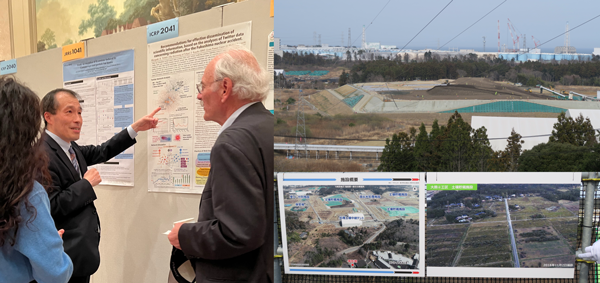Disclaimer: machine translated by DeepL which may contain errors.
Cross-disciplinary Collaboration and Trans-Science
Hiroyuki Torii, Associate Professor, Department of Chemistry

I am originally from a nuclear physics laboratory, but I have never studied atomic nuclei themselves. Since graduate school, I have been involved in experimental research at the CERN Institute in Geneva, Switzerland, testing the fundamental symmetries of physics through the spectroscopy of exotic atoms containing antiprotons, and now I am working on muonium, an exotic atom containing muons, at the J-PARC accelerator facility in Tokai-mura, Japan. muonium, an exotic atom containing muons, at the J-PARC accelerator facility in Tokai. I call my specialty particle atomic physics, meaning atoms containing elementary particles. Because my research is in such a boundary field, I have been in the field of collaboration with various fields, and I am proud to have presented my research in various sessions of the Physical Society of Japan, including those on elementary particles, atomic nuclei, atomic molecules, quantum electronics, physical properties, physics education, and so on.
 (Left) Discussions at the International Commission on Radiological Protection ICRP 2023 International Conference, where I also had a conversation in French with Prof. J. Lochard, former Vice-Chair of the ICRP.
(Left) Discussions at the International Commission on Radiological Protection ICRP 2023 International Conference, where I also had a conversation in French with Prof. J. Lochard, former Vice-Chair of the ICRP.(Right) Removed soil piled up like an ancient tomb at the interim storage facility. The Fukushima Daiichi Nuclear Power Plant can be seen beyond it.
A major turning point for me was the Great East Japan Earthquake and nuclear power plant accident in 2011. While the whole country was in a state of panic over the effects of radiation, I began giving lectures on radiation education at the Komaba campus, where I was working at the time, which were well received and continued for the next 11 years. These efforts were also recognized, and six years later I joined the Department of Chemistry as a faculty member in charge of radiation control in the Faculty of Science.
Now, to talk about radiation, we need not only physics and chemistry but also a wide range of academic fields such as radiation biology, environmental science, agriculture, social theory of science and technology, law, etc. In fact, I have met with professors of medicine, immunology, and other fields of science and technology. In fact, it was a valuable experience for me to work with professors of medicine and immunology on committees of the Japan Society for the Promotion of Science (JSPS) and to conduct risk communication activities for the public in Fukushima. Every year, students from the Graduate School of Science who are deeply interested in communicating science to society participate in the program, and it is encouraging to see them engage in heated discussions with students from other Graduate Schools.
I continue to be involved in radiation issues through a research project commissioned by the Ministry of the Environment, and among other things, I am conducting research on effective scientific information dissemination methods in the age of social networking through analysis of Twitter (now X) data. It is only an illusion of scientists that people will be convinced if they are given correct scientific knowledge. For issues that affect society, such as nuclear power and the use of radiation, it is important to think in terms of trans-science, which is an area where science can ask questions but science alone cannot provide answers. We are discussing these issues together with experts in information science, sociology, and psychology, as well as with high school teachers. For specifics, please refer to the "Interpreter's Bible" column in Gakunai Kōhō, which I write every year.
Ten years ago, I would never have imagined that my paper would be published in a medical or information journal, but understanding, collaboration, and fusion of different fields are indispensable as we aim for collective and comprehensive knowledge that integrates specialized knowledge. Exposure to diverse ideas in different research fields is intriguing and leads to one's own development. While it is important to master one's specialty, I would like to encourage young scientists to be aware of the importance of broadening their perspectives.
The Rigaku-bu News collects essay submissions. We welcome all submissions, regardless of whether they are self-recommended or not. We especially welcome submissions from Faculty and graduate students. However, the Communications & Public Relations Committee will decide whether or not to publish your essay.Please send your contributions to rigaku-news@adm.s.u-tokyo.ac.jp.
Published in the March 2024 issue of The Rigakubu News


